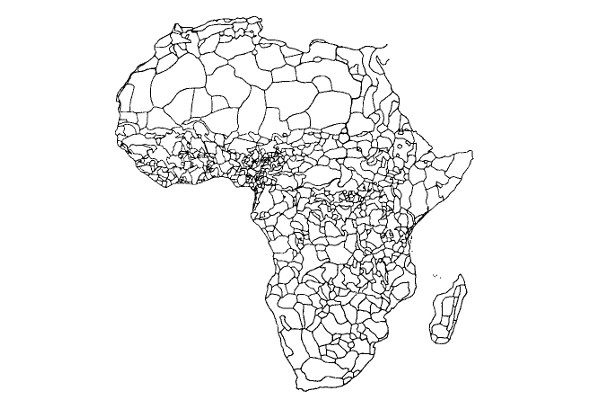I am teaching a short module in the M.Sc. In Economics for Development this term on “deep roots” of economic development. Enrico Spolaore and Romain Wacziarg provide an excellent summary of this literature here. One half of one of one lecture will be on “ethnicity,” which raises the question – is ethnicity is really something “deep”?
This is important, because there several recent papers suggest that the historical legacies of institutions particular to specific ethnic groups – so-called “ethnic institutions” – matter for real outcomes. A forthcoming paper by Stelios Michalopoulos and Elias Papaioannou and an older paper by Nicola Gennaioli and Ilia Rainer find that parts of Africa with more centralized pre-colonial states have a greater density of night-time lights and better provision of public goods in the present. Elise Huillery, similarly, has linked pre-colonial states to modern outcomes through the degree of hostility to colonial rule. Other ethnic institutions also matter: the Tswana kgotlas that constrained elites before colonial rule may still check their power today. In some cases, these institutions have been transformed under colonial rule, (e.g. chieftaincy in Sierra Leone, land tenure in Ghana), but still matter for present-day outcomes such as investment and public goods. In my own work, I have argued that pre-colonial patterns of land rights predict present-day patterns of land acquisition in Ghana, and that the distribution of polygamy over space in Africa is in part a legacy of pre-colonial ethnic institutions.
So, is ethnicity deeply rooted? A small number of studies have attempted to show that some of the causes of ethnic diversity are very old. Stelios Michalopoulos has found a remarkably robust correlation between geographic heterogeneity and ethnic diversity. Though this is consistent with several theories, he believes it is driven ultimately by specialization; ethnic groups develop subsistence practices adapted to their environments, and these activities come to define them. The diversity in geographic endowments within ethnic homelands also predicts inequality across ethnic groups today. Pelle Ahlerup and Ola Olsson take a different view. Over time, they argue that peripheral members of one group split off as the centre finds providing public goods to be too costly. Though theirs is a primarily theoretical paper, they show that countries that have been inhabited longer by humans are more diverse today. Javier Birchenall argues instead that pathogen stress encouraged isolation in pre-industrial societies, leading to greater diversity over time. Klaus Demset, Ignacio Ortuño-Ortín and Romain Wacziarg show it is the oldest linguistic cleavages that best predict the onset of conflict in the recent past.
But, strikingly, there is a substantial amount of research showing that ethnicity is malleable. Parts of Africa that were hit harder by the slave trade are more ethnically diverse today, a correlation that holds even when distance from regions of slave demand are used to control for possible reverse-causation. Mahmood Mamdani has famously argued that the identities of “Hutu” and “Tutsi” are ultimately political entities shaped by colonialism. Even where ethnic identities are clear, they are exploited selectively. Africans identify more with their ethnic group relative to their country when elections draw near. When allowed to act anonymously in a lab, Ugandans treat their co-ethnics no better than members of other ethnic groups. Ethnic groups that are adversaries when both are large enough to contest power in one country become allies when they are only minority groups in another country.
Together, these results present something of a puzzle. If “ethnic institutions” matter, we should know where ethnicity comes from, and why it changes.


Hello James,
First, thank you for your post, very insightful.
Second, do you have any resources on this topic in French, by chance?
Thank you in advance,
Travis Warrington
Rene Lemarchand has published a lot on the topic (that there is no genetic difference between the so called Hutus and Tutsis, but who benefits from creating this distinction). A lot of his publications are in French.
Excellent post.
It would be good to enlarge your analysis beyond Africa. I think you will find more fluidity in SSA than elsewhere. Think of the Levant, where identities look much less malleable.